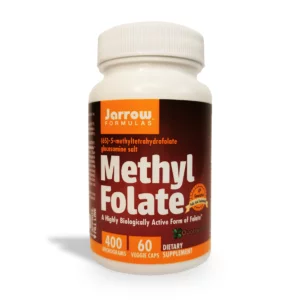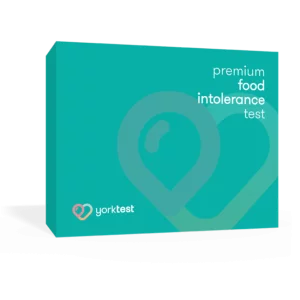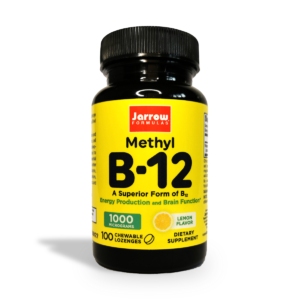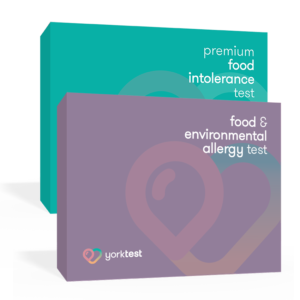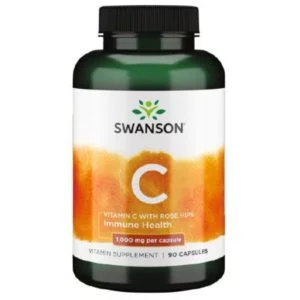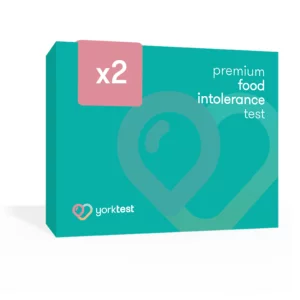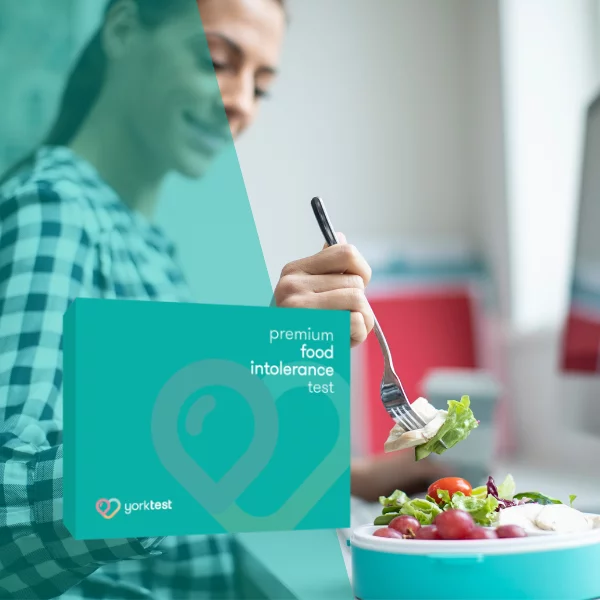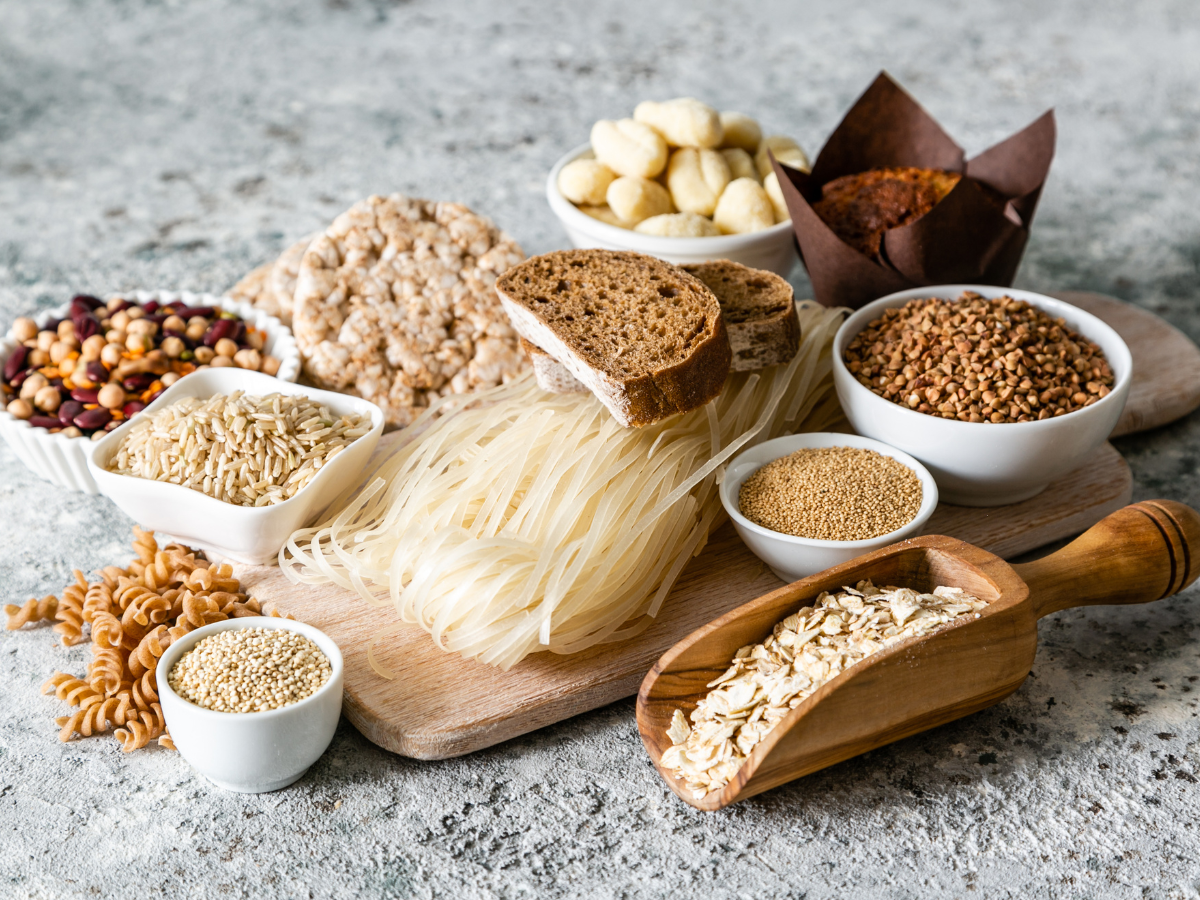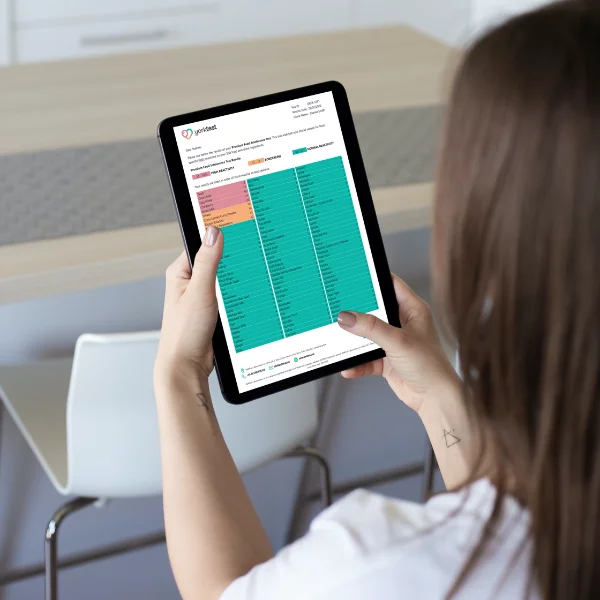Are you suffering with bloating?
Table of Contents
- What is Bloating?
- What causes Bloating?
- Foods that cause bloating
- What are FODMAPS foods?
- Bloating Symptoms
- Why do I get bloated after eating?
- Foods that reduce bloating
- How can I relieve bloating fast?
- Can a food intolerance test help with Bloating?
- Our York Test survey and bloating
What is Bloating?
Bloating is a common condition that leaves the abdomen feeling full and tight, and it may also look swollen or distended. It’s usually caused by too much gas or an accumulation of fluid, and can be accompanied by abdominal pain, stomach cramps and gas.
There are many possible causes of bloating (see below for a longer list), but some common triggers can include swallowing too much air while eating, being lactose intolerant, having IBS, or eating too much fibre. While bloating can be uncomfortable, it is usually harmless and often resolves on its own. However, if it is a persistent problem it’s a good idea to see a doctor or speak to your GP to rule out any underlying medical conditions.
What causes bloating?
A build-up of gas in the stomach and intestines is primarily the most common cause of bloating. Bloating can be accompanied by either mild discomfort all the way up to sharp bursts of intense pain. People who experience bloating report that they feel as though something is trapped inside their stomach. You may feel that your stomach appears to be puffy and stretched.
So, what is responsible for bloating? Unfortunately there is no single answer; however, here are some of the most common causes of bloating.
- Swallowing too much air – this can happen by talking whilst eating, chewing with your mouth open, and chewing gum.
- IBS (Irritable Bowel Syndrome) – while bloating is not suffered by all those with IBS, it is a very common symptom of the condition.
- PMS – some women find that PMS is accompanied by bloating, indigestion and constipation.
- Coeliac disease – excessive bloating might be a sign that the intestine is reacting to the gluten in your diet; you could be suffering from coeliac disease.
- Food intolerance – if you regularly feel bloated and have been feeling so for a long period of time, this could mean that you have a food intolerance. This can manifest itself in three ways. Firstly, too much gas may be produced in reaction to the food. Secondly, as a result of food intolerance your bowel may not empty properly, and thirdly the food may cause the gas to be trapped.
While this is by no means an exhaustive list of reasons why you may be bloated, these common causes may give you some insight into what is causing you so much pain. If you are concerned about your bloating you should get checked out by your GP.
Foods that Cause Bloating
As discussed, there are many reasons why you may feel bloated, including your diet.
It is reported that there are some foods which are known to produce more gas than others. Foods that can cause bloating are:
- Beans
- Wheat
- Onions
- Garlic
- Lentils
It is important to note that, as individuals, our reactions to the foods and drinks we consume varies a great deal. An ingredient which may cause problems for one person could be completely acceptable for another. At YorkTest, we like to refer to this as our personal ‘food fingerprint’.
Did you know that a food intolerance test can help to eliminate the guesswork on finding what foods you are reacting to in your current diet? Our simple home test analyses your reactions to the foods outlined above, as well as 200 other food and drink ingredients, such as cow’s milk, gluten, cauliflower and apples.
What are FODMAPs foods?
The term FODMAP stands for “Fermentable Oligosaccharides, Disaccharides, Monosaccharides, and Polyols”. Certain foods are classed as FODMAPs, meaning that they are poorly absorbed by the body, which may result in IBS-type symptoms such as abdominal pain and bloating.
High FODMAP foods, such as onion and garlic, are foods which the gut often finds difficult to digest. Discovering and, most importantly, understanding your own personal thresholds of a certain ingredient may help you make the best dietary choices in order to optimise your diet, take control of your bloating and quality of life.
Here are some examples of high FODMAP foods:
1) Cabbage.
2) Brussel sprouts.
3) Foods high in Fructose (fruit sugar), such as apples and food containing corn syrup.
4) Foods based on Lactose (milk sugar).
5) Foods high in Fructans, which are found in numerous vegetables and also wheat.
6) Foods that contain sugar alcohols- this includes artificial sweeteners and some fruits.
7) Foods based on Galactans – Legumes such as beans and peas.
– Salt and sodium rich foods are well known contributors to bloating so try and avoid over-eating these foods.
– Increase the amount of potassium rich foods you eat. Common foods include sunflower seeds, almonds and mushrooms.
– Avoid carbonated drinks, as they will only add to the gas in your digestive system.
– Start taking probiotics – these can help maintain digestive health and regular bowel movements by maintaining a healthy culture of bacteria in your gut.
– Eat food slower and in smaller portions – both of these will prevent you from bloating that’s caused by overeating.
As we’ve mentioned, bloating can be a sign of a food intolerance. Therefore, finding out your trigger foods could be a great way to manage your bloating.
Bloating Symptoms
Symptoms tend to get worse after eating meals and throughout the day, though some people experience bloating immediately upon waking up.
If you’re unsure whether you’re experiencing bloating, look out for these common symptoms.
- Stomach feeling tight, painful or distended after eating. This is often described as feeling like there is a balloon inflated in the stomach.
- A feeling of uncomfortable ‘trapped wind’ or gas in the stomach.
- Gurgling sounds in the stomach that are quite audible.
- Experiencing sharp abdominal pains as the abdominal muscles spasm to deal with excess gas and pressure.
- Mild cases may cause subtle belly swelling, while severe bloating can visibly distend the stomach.
Why do I get Bloated after eating?
There are several reasons why bloating commonly occurs after eating meals. One is that eating causes the stomach to fill up with food and liquid, which stretches the stomach walls and creates a feeling of fullness and tightness. Eating also increases contractions in the intestines to move food through the digestive tract. This physical movement – referred to as gastric motility or peristalsis – of food can cause gas and abdominal distension.
As mentioned earlier, the types of foods we eat can play a role too. Foods that are high in fat, sugar, fibre, starches, and artificial additives are more likely to cause bloating for some people due to poor digestion. Conditions like food intolerances, IBS, SIBO, gastritis, and gastroparesis can interfere with proper digestion and cause post-meal bloating as well.
A good approach is to pay attention to which foods tend to trigger bloating and adjust the diet accordingly. Eating more slowly and avoiding carbonated beverages, excessive salt, and chewing gum can also help to reduce bloating for some people.
Foods that reduce Bloating
To manage your symptoms of bloating, you can try to adjust your diet and opt to include foods and ingredients like the following:
Yoghurt – Yogurt contains probiotics that can help improve digestion and reduce gas production. Opt for plain, unsweetened varieties.
Peppermint – Peppermint has antispasmodic effects that can relax the intestines and ease bloating symptoms. Try drinking peppermint tea or take enteric-coated peppermint oil capsules.
Ginger – Ginger has anti-inflammatory properties that may relieve bloating. Try ginger tea, or chewing on raw ginger slices.
Fennel seeds – Fennel seeds help relax intestinal muscles to allow gas to pass. You can chew fennel seeds plain, or use them to flavour dishes.
Lettuce and carrots – These, and other non-gas producing vegetables, help to add fibre to your diet without producing excess gas during digestion.
Pineapple – Pineapple contains an enzyme called “bromelain” that aids in protein digestion, reducing symptoms of bloating and constipation.
It’s important to keep in mind that different foods affect people differently, so these foods may not help reduce bloating for everyone.
How can I relieve bloating fast?
Whether you’ve been bloated daily, or you’ve found your stomach swollen before a big event or night out, there are ways to relieve a swollen stomach. Feeling like you’re a balloon who is about to pop can be uncomfortable and even distressing, but it’s reassuring to know that there are measures you can take to tackle bloating.
Here are 5 ways you could relieve your bloating:
- Eat slowly – chomping your food too fast or eating on the go may cause bloating. This is due to inhaling excess air. Even chewing gum takes in more air than usual.
- Avoid carbonated and fizzy drinks – It comes as no surprise that all those bubbles in carbonated drinks may expand your stomach. It’s advised to opt for still water and aim to keep hydrated with 8 glasses a day.
- Exercise regularly – regularly exercising and moving around in general also helps keep your digestive tract moving along. This may eliminate constipation and contribute to alleviating bloating.
- Improve your gut health – enhancing your gut health may also help ward off bloating. Popping a good probiotic could help to keep your digestive tract moving and, in turn, alleviate constipation, abdominal pain and the dreaded bloat.
- Rule out food intolerance – on the lines of gut health, food intolerance can lead to bloating. Food intolerances can cause inflammation in the gut and gut symptoms.
If you find yourself experiencing bloating on a regular basis, you should visit your GP to rule out any underlying medical conditions. Thereafter, it might be a worthwhile opportunity to take a closer look at your diet if you continue to experience recurring or prolonged bloating.
Can a food intolerance test help with bloating?
The market for food intolerance tests is heavily saturated due to an increased demand of interest in health and wellbeing. That’s why it’s important for you, the reader, to make sure you make well-informed choices when it comes to purchasing a food intolerance† test.
Here at YorkTest, we’ve been going for 40 years and are the UK’s leading provider in food intolerance testing†. We also provide post-test support in the form of guidebooks and nutritional consultations with BANT* registered nutritional therapists to ensure you’re replacing your trigger foods with healthy and nutritious alternatives.
Our YorkTest Survey and Bloating
The University of York conducted a survey** to help understand the benefits of elimination diets based on the results of a food intolerance test†.
Out of 576 people who reported bloating as a primary symptom, 92% reported an improvement having removed their ‘trigger’ foods. We define these as foods which show a positive IgG reaction to antibodies in the blood.
Overall in the study, 76% of people who rigorously followed the recommended diet reported a benefit, 68% of which experienced this after 3 weeks.
Phoebe Turner BSC, MBIOL (HONS)



